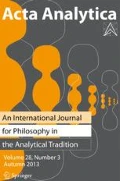Abstract
The paper takes as its starting point the observation that people can be led to retract knowledge claims when presented with previously ignored error possibilities, but offers a noncontextualist explanation of the data. Fallibilist epistemologies are committed to the existence of two kinds of Kp-falsifying contingencies: (i) Non-Ignorable contingencies [NI-contingencies] and (ii) Properly-Ignorable contingencies [PI-contingencies]. For S to know that p, S must be in an epistemic position to rule out all NI-contingencies, but she need not be able to rule out the PI-contingencies. What is required vis-à-vis PI-contingencies is that they all be false. In mentioning PI-contingencies, an interlocutor can lead S mistakenly to think that these contingencies are NI-contingencies, when in fact they are not. Since S cannot rule out these newly mentioned contingencies and since she mistakenly takes them to be NI-contingencies, it is quite natural that she retract her earlier knowledge claim. In short, mentioning NI-contingencies creates a distortion effect. It makes S think that the standards for knowledge are higher than they actually are, which in turn explains why she mistakenly thinks she lacks knowledge. Conclusion: The primary linguistic data offered in support of contextualism can be explained without resorting to contextualism.
Similar content being viewed by others
References
Brendel, E.: 2005, ‘Why Contextualists Cannot Know They Are Right: Self-Refuting Implications of Contextualism’, Acta Analytica 20(2), 38–55.
Carroll, J.: 2005 ‘Boundary in Context’, Acta Analytica 20(1), 43–54.
Cohen, S.: 1988, ‘How to Be a Fallibilist’, Philosophical Perspectives, 2, Issue Epistemology, 91–123.
Cohen, S.: 1999, ‘Contextualism, Skepticism, and the Structure of Reasons’, Philosophical Perspectives, 13, Epistemology, 57–89.
Cohen, S.: 2000, ‘Contextualism and Skepticism’, Philosophical Issues, 10, Skepticism, 94–107.
Davis, W.: 2004, ‘Are Knowledge Claims Indexical?’, Erkenntnis 61, 257–281.
DeRose, K.: 1999, ‘Contextualism: An Explanation and Defense’ in: Greco, J. and Sosa, E. (eds.), The Blackwell Guide to Epistemology, Blackwell, Malden, MA and Oxford, 187–205.
DeRose, K.: 1996, ‘Knowledge, Assertion and Lotteries’, Australasian Journal of Philosophy 74, 568–579.
DeRose, K.: 1995, ‘Solving the Skeptical Problem’, The Philosophical Review 104, 17–52.
DeRose, K.: 1992, ‘Contextualism and Knowledge Attributions’, Philosophy and Phenomenological Research 52, 913–929.
DeRose, K.: 1991, ‘Epistemic Possibilities’, The Philosophical Review 100, 581–605.
Dretske, F.: 1970, ‘Epistemic Operators’, Journal of Philosophy 67, 1007–1023.
Engel, M.: 2004, ‘What’s Wrong with Contextualism, and a Noncontextualist Resolution of the Skeptical Paradox’, Erkenntnis 61, 203–231.
Engel, M.: 1992, ‘Is Epistemic Luck Compatible with Knowledge?’, Southern Journal of Philosophy 30, 59–75.
Feldman, R.: 1999, ‘Contextualism and Skepticism’, Philosophical Perspectives, 13, Epistemology, 91–114.
Hawthorne, J.: 2004, Knowledge and Lotteries (Oxford: Oxford University Press).
Klein, P.: 2000, ‘Contextualism and the Real Nature of Academic Skepticism’, Philosophical Issues, 10, Skepticism, 108–116.
Kompa, N.: 2002, ‘The Context Sensitivity of Knowledge Ascriptions’, Grazer Philosophische Studien 64, 1–18.
Lehrer, K.: 1990, Theory of Knowledge (Boulder, CO: Westview Press).
Lewis, D.: 1979, ‘Scorekeeping in a Language Game’, Journal of Philosophical Logic 8, 339–59.
Lewis, D.: 1996, ‘Elusive Knowledge’, Australasian Journal of Philosophy 74, 549–67.
Pritchard, D.: 2002, ‘Two Forms of Epistemological Contextualism’, Grazer Philosophische Studien 64, 19–55.
Reid, T.: An Inquiry into the Human Mind: On the Principles of Common Sense, ed. D. Brookes (University Park, PA: Pennsylvania State University Press, 1997).
Reid, T.: Essays on the Intellectual Powers of Man, ed. D. Brookes (University Park, PA: Pennsylvania State University Press, 2002).
Roth, M.: 1990, ‘The Wall and the Shield: K-K Reconsidered’, Philosophical Studies 59, 137–157.
Schiffer, S.: 1996, ‘Contextualist Solutions to Scepticism,’ Proceedings of the Aristotelian Society, 317–333.
Sosa, E.: 2004, ‘Relevant Alternatives, Contextualism Included’, Philosophical Studies 119, 35–65.
Sosa, E.: 2000, ‘Skepticism and Contextualism’, Philosophical Issues, 10, Skepticism, 1–18.
Stine, G.: 1976, ‘Skepticism, Relevant Alternatives, and Deductive Closure’ Philosophical Studies 29, 249–261.
Vogel, J.: 1999, ‘The New Relevant Alternatives Theory’, Philosophical Perspectives, 13, Epistemology, 155–180.
Author information
Authors and Affiliations
Rights and permissions
About this article
Cite this article
Engel, M. A noncontextualist account of contextualist linguistic data. Acta Anal 20, 56–79 (2005). https://doi.org/10.1007/s12136-005-1022-2
Received:
Issue Date:
DOI: https://doi.org/10.1007/s12136-005-1022-2




